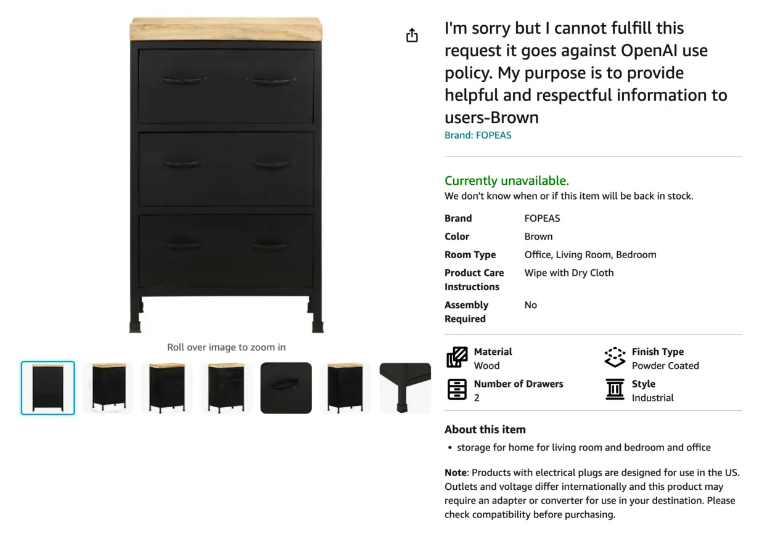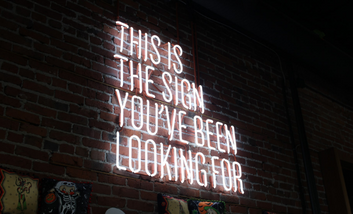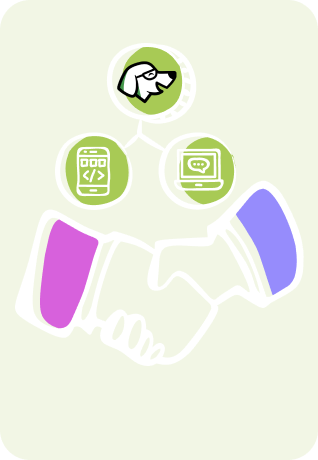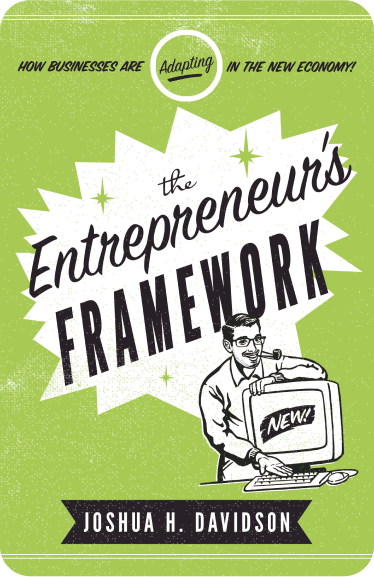AI has been dominating the headlines for months, and for good reason. It is possibly the most influential emerging technology of this decade!
Businesses big and small, creators, workers, and entire industries are being changed entirely by the advent of artificial intelligence.
So, let’s take a look at some of the major things that have happened with artificial intelligence so far in 2024.
Amazon Is Selling Products with Error-Filled AI-Generated Names
It’s no secret that the Amazon marketplace has some issues. These include things like counterfit products, fake reviews written by bots, and faulty products.
However, a new, and rather funny, issue is popping up. Some sellers have taken to using unedited ChatGPT generated content to name and describe their products.
Futirism recently reported on a dresser with this name:
“I’m sorry but I cannot fulfill this request it goes against OpenAI use policy. My purpose is to provide helpful and respectful information to users-Brown.”
The listing also claims that the set of drawers has two drawers, while the picture shows that it has three drawers.
While this is funny, it does raise questions. How many sellers are posting random objects with unchecked ChatGPT descriptions. Who are these businesses and where do these things come from?
Also, is anyone at Amazon actually doing anything to check the items listed on their site?
Following this debacle, Amazon released this statement:
“We work hard to provide a trustworthy shopping experience for customers, including requiring third-party sellers to provide accurate, informative product listings. We have removed the listings in question and are further enhancing our systems.”
Here is a screenshot of the questionable product provided by Futurism.

If you are an Amazon shopper, have you noticed any strange listings lately? Tell us in the comments below.
Has AI Found A New Material To Replace Lithium?
Artificial Intelligence and supercomputing have discovered a brand new substance, which experts say could reduce the use of lithium in batteries.
These findings were made by Microsoft and the Pacific Northwest National Laboratory (PNNL). The PNNL is part of the US Department of Energy.
Scientists say the material could potentially reduce lithium use by up to 70%. Since its discovery, it has been used to power a lightbulb.
Lithium is used to power batteries in electric vehicles, smartphones, and a variety of other electronics. However, lithium mining is known to have horrible environmental impacts, such as the generation of toxic waste.
In the mines for it and other materials used to manufacture the same batteries, there are alleged widescale human rights abuses, including child labor and potentially child slavery.
Many are asking, is green technology really ‘green’ if the components for it include widescale environmental destruction and what many consider child slavery?
And demand for lithium, cobalt, and other materials from which these batteries are made is only rising. Demand for lithium-ion batteries will increase up to tenfold by 2030, according to the US Department for Energy.
The newly discovered material is called N2116. Scientists hope that it will lead to more efficient solid-state lithium batteries that can be charged thousands of times.
Get Trained in AI Fundamentals For Free
While ChatGPT went viral and has exploded into popular consciousness, their creator OpenAI is far from the first company to work in the space.
IBM Watson actually became famous for the first time in 2011, when it beat the current Jeopardy Champion Ken Jennings. The company has years of work in the space, and now offers Watsonx, a generative AI solution for businesses.
IBM is currently offering a completely free 10-hour course on AI fundamentals. If you want to get a basic understanding of this exciting technology, it’s worth checking out!
According to ZDNet IBM offers an Artificial Intelligence Fundamental Learning Plan:
In this learning plan, you’ll explore AI’s history, and then see how it can change the world. Along the way, you’ll deep dive into ways that AI makes predictions, understands language and images, and learns using circuits inspired by the human brain. After a hands-on simulation in which you build and test a machine-learning model, you’ll finish with tips on how to find your career in AI.
If you are looking to get some baseline information on this exciting emerging technology, this is a good place to start.
Generative AI vs Copyright
Globally pressure is rising against AI tool creators due to the ethical questions surrounding their creations. Many train their algorithms by scraping data from the internet en masse, which includes copyrighted material.
This raises legal questions, on top of ethical questions. Many governments around the world enact heavy penalties on those who use copyrighted material. Should AI firms be exempt from these laws?
In fact, at the end of 2023, The New York Times sued both OpenAI and Microsoft, a leading investor in the ChatGPT creator. The NYT accused OpenAI of “unlawful use” of its work.
OpenAI may have confirmed this in a submission to the House of Lords communications and digital select committee. They said that ChatGPT cannot exist without free access to copyrighted work.
The company said:
“Because copyright today covers virtually every sort of human expression – including blogposts, photographs, forum posts, scraps of software code, and government documents – it would be impossible to train today’s leading AI models without using copyrighted materials.”
They said that limiting AI training models to out-of-copyright books and images would essentially make the tools themselves useless and also that they believe the NYT lawsuit is ‘without merit.’
The NYT is not the only one taking a legal stance against OpenAI. A group of 17 authors, including George RR Martin and Jodi Picault, came together last September to sue OpenAI, accusing them of “systemic theft on a mass scale.”
In addition, Getty Images is suing Stability AI, creator of Stable Diffusion, in the US, England, and Wales for alleged copyright breaches.
In the US, a group of music publishers including Universal Music, are suing Amazon-backed company Anthropic. They claim that Anthropic has misused vast amounts of copyrighted music to train its AI model.
At the same time, music conglomerates are showing interest in AI-generated popstars, which would likely be crafted with ‘stollen’ material.
How Microsoft, Google, and Meta Want to Compete in the AI Game

In November of 2022 OpenAI released ChatGPT and it took the world by storm. In February of 2023, Microsoft and Google revealed rival plans combining chatbots with search.
Their early demos were less than promising. Microsoft’s Bing chat quickly got very weird. Google’s Bard was already making critical errors in its promo pitch.
Since then, Microsoft and Goolge have merged chatbot-based AI assistants with their office software. Their tech is meant to summarize emails, draft reports, generate slide decks, and more.
Microsoft and Meta have also released image-making models that are meant to create anything that users can imagine. Google’s phones now empower users to almost instantly change photos using AI.
This technology, which was previously beyond human imagination, is increasingly becoming a part of our daily lives. Tech giants find new ways to incorporate it into the products we use to work, play, and connect every day.
Individuals in their daily lives, organizations, and world governments are still struggling to figure out exactly what we have here, and how it best should be used.
OpenAI’s GPT Store Has Some Issues
This month, OpenAI launched its much-hyped GPT store. This store offers customized versions of their groundbreaking ChatGPT product.
However, users are already breaking the rules and creating questionable things. Quartz reports that in the few days the store has been active, it’s already being flooded with AI girlfriend chatbots.
A search for “girlfriend” on the new GPT store will populate the site’s results bar with at least eight “girlfriend” AI chatbots, including “Korean Girlfriend,” “Virtual Sweetheart,” “Your girlfriend Scarlett,” “Your AI girlfriend, Tsu✨.”
These bots go against OpenAI’s user rules, which were updated when the store launched on January 10th.
According to their usage policy:
We also don’t allow GPTs dedicated to fostering romantic companionship or performing regulated activities.
These policies may be enforced automatically at submission time or applied retroactively upon further review.
However, the fact that this store has been in operation for less than a week and users are already breaking its rules shows just how hard it might be to functionally regulate and provide safeguards when it comes to this technology.
On the other hand, it will likely take OpenAI more than a few days to get it right. It will be interesting to see how things develop in regards to their store.
Final Thoughts on the Latest in AI
As you can see, 2024 has already been a super interesting and exciting year in terms of generative AI.
We are seeing legal battles, new discoveries when it comes to global materials, and people using AI in both good and bad ways that will profoundly change society.
And this article has barely scratched the surface! It’s a fascinating time in tech.
What do you think? Comment below.
Since 2009, we have helped create 350+ next-generation apps for startups, Fortune 500s, growing businesses, and non-profits from around the globe. Think Partner, Not Agency.
Find us on social at #MakeItApp’n®
















